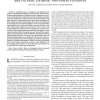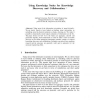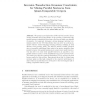2082 search results - page 22 / 417 » Using model knowledge for learning inverse dynamics |
150
click to vote
TROB
2010
14 years 9 months ago
2010
Abstract--Acquisition of new sensorimotor knowledge by imitation is a promising paradigm for robot learning. To be effective, action learning should not be limited to direct replic...
155
click to vote
WSC
2007
15 years 4 months ago
2007
Adaptive Time Warp protocols in the literature are usually based on a pre-defined analytic model of the system, expressed as a closed form function that maps system state to cont...
148
click to vote
CORR
2011
Springer
14 years 9 months ago
2011
Springer
Modeling the behavior of imperfect agents from a small number of observations is a difficult, but important task. In the singleagent decision-theoretic setting, inverse optimal co...
127
click to vote
SEAAI
1998
Springer
15 years 6 months ago
1998
Springer
Today most of the information we produce is stored digitally. We are slowly forced to leave behind us thinking about information as something stored in physical containers as books...
129
click to vote
IJCNLP
2005
Springer
15 years 8 months ago
2005
Springer
Abstract. We present a new implication of Wu’s (1997) Inversion Transduction Grammar (ITG) Hypothesis, on the problem of retrieving truly parallel sentence translations from larg...



